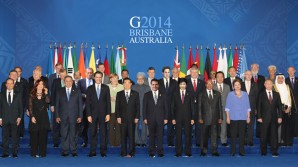
Ahead of the mid-November G20 summit in Brisbane, Australia, the host delegation tried mightily to paint the summit as a fight for economic change, not climate change. However, powerful nations who are also at the forefront of the climate battle — the United States, Japan, China and France — reproached and pressured Australia and the rest of the summit to take “strong and effective action” against climate change.
The climate insistence, in which those aforementioned nations pressed the G20 members to reveal emission-reduction goals well in advance of the UN climate summit in Paris in 2015, was music to the ears of French financier and climate activist Christophe Mazurier.
Mazurier has long stood with his adopted nation of the Bahamas on the issue of climate change. According to the UN, the Bahamas, an archipelago of hundreds of islands in the Caribbean, is one of the top five nations most threatened by climate change’s destructive effects. Mazurier was pleased that although the tiny island nation was not represented at the G20 summit, where leaders of the world’s most powerful nations gathered, the fight was not forgotten nor pushed aside.
“We must welcome in this regard the Sino-American rapprochement that has put pressure on an extremely hostile Australian delegation,” Mazurier wrote in a column for Les Echos following the summit. “Also to be welcomed is the diplomatic work of France, which under the leadership of President Hollande has made (climate change) a priority.”
The climate change language was packaged as part of a communique produced by the event, which contained more than 800 measures to induce global growth over the next few years. In addition to urging countries to report emission reduction plans in the next few months, there was also pressure to monetize and mobilize the Green Climate Fund, which was launched five years ago to assist nations in developing defenses and alternative solutions to growing climate concerns. The United States has pledged $3 billion, Japan $1.5 billion and, most recently, France $1 billion to the fund.
Mazurier, who was the longtime chairman of the board of directors at Geneva, Switzerland-based Banque Pasche, was also pleased with the economic outcomes of the summit. Despite Putin’s walkout, which Mazurier argued unfairly dominated the headlines, the remaining 19 world leaders were able to hammer out effective and efficient global growth policies. Through what Mazurier saw as the liberalization of the global economy and its national subsidiaries, economic engines like infrastructure development, improvement to labor practices and tax transparency would create a more sustainable model for growth than the world has known in the past.
But while the economic changes, which the G20 hopes will boost the global economy by 2.1% by 2018, are harder to quantify and enforce, the climate change reckoning will come sooner rather than later. Mazurier praised in particular the peer pressure of the United States and China, and the leadership of France as these nations try to convince the rest of the world to reduce emissions, promote green growth and start meeting climate change head-on.
Photo: Les Echos

